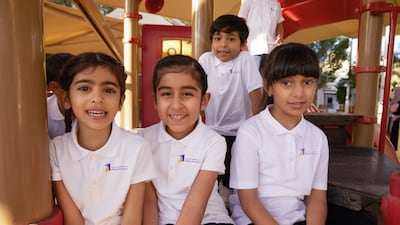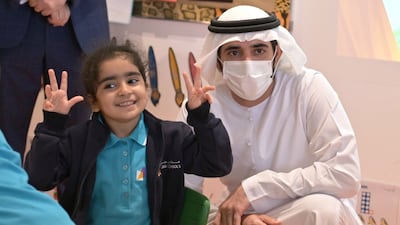A new model of government schools will change the medium of teaching from Arabic to English to prepare pupils for university and work life in the UAE and abroad.
Ajyal Schools, or Generation Schools, will be operated by leading private sector education groups Taaleem, Aldar Education and Bloom Education and serve about 14,000 pupils nationwide.
Schools will hire bilingual teachers, put up signage in English and Arabic, and use visual cues and videos to teach pupils English.
Previously, pupils at the selected government schools, mostly in the Northern Emirates, would study all subjects in Arabic with a lesson set aside for English.
Taaleem
However, starting the new academic year, the majority of subjects, including mathematics and science, will be delivered in English at the new model of schools with only Islamic studies, Arabic and social studies being taught in Arabic. Public schools in Dubai and Abu Dhabi made the switch more than half a decade ago.
Existing government schools will be revamped and taken over by the education providers, who say new-look classes will embrace technology, science and innovation, and help prepare young Emiratis for jobs of the future.
Heather Mann, director of education at Taaleem, said the teaching methods at these schools would be modified to help children learn subjects in English.
“We are moving to the full curriculum being delivered in English. Partly, the reason for the change is that the business world and financial world use English. It truly is about preparing pupils for the future," said Ms Mann.
"Many of the students will go to universities in the UAE and quite a fair number might go to the US.
"They will need to be able to converse and write to a high standard in English, particularly if they are going to universities overseas, their English skills need to be at a really high level. So the way of doing that is to immerse them in English.”
Hundreds of Emiratis choose to study in Britain each year and more than 1,700 travelled to the US for higher studies in 2021.
Ms Mann said younger pupils will be taught the language through play and encouraged to develop their vocabularies before they start reading and writing.
Teachers will hold daily storytelling classes to improve literacy and engage pupils.
Arabic still a priority

Ms Mann said Arabic is still a priority for the schools.
"We are still looking to strengthen Arabic. We value their mother tongue and will be encouraging them to speak in English and Arabic," she said.
Nilay Ozral, chief executive of Bloom Education, said the schools would strike a balance between teaching children English and ensuring they do not lose their fluency in Arabic.
She said the focus would be on making learning English fun and lively for pupils.
"Initially, especially for Grades 1 to 3, we will have a lot more focus on literacy and numeracy when we are delivering the curriculum, so that pupils improve their English," said Ms Ozral.
"There will be a lot more signage around the school in the classrooms both in Arabic and English so that children can grasp the language.
"We have to make sure that the homeroom teachers that we are going to hire, some of them need to be bilingual."
High achieving graduates
The schools will introduce reading strategies and may bring parents in, to support the children's learning.
In recent years, UAE's government schools have stepped up their focus on teaching in English.
In 2017, education authorities announced that pupils would study more subjects in English as part of the changes.
The move was made as the government sought to encourage more young people to study science and improve their English.
At the time, many government school pupils failed the high school exit test that measures their level of English readiness in grade 12. They had to take a foundation year to improve before attending university.
Natasha Ridge, executive director at Sheikh Saud bin Saqr Al Qasimi Foundation for Policy Research, said English language competencies had improved dramatically at government schools.
"Currently, we are seeing many high achieving graduates coming out of government schools applying for scholarships at the foundation, who have very good English competency," said Ms Ridge.
"It was a problem some years ago, but I don't think we have that issue these days. Still, some schools will be weaker than others. But by and large, you know, English language competencies have definitely improved a lot."
Rebecca Keogh, English for academic purposes manager at University of Birmingham in Dubai, said students who had not met the undergraduate language proficiency requirement or academic requirements were enrolled in the foundation programme.
"We definitely get a lot of Arabic-speaking students and we definitely get a lot of Emirati students," said Ms Keogh.
"We do have Emirati speakers who are quite verbally fluent when they enter university but do need to work on essay-writing skills."
She said the more they were taught in English at high schools in the UAE, the more it would help them at university.
She said that along with language skills, pedagogy mattered as pupils needed skills like critical thinking at university.






